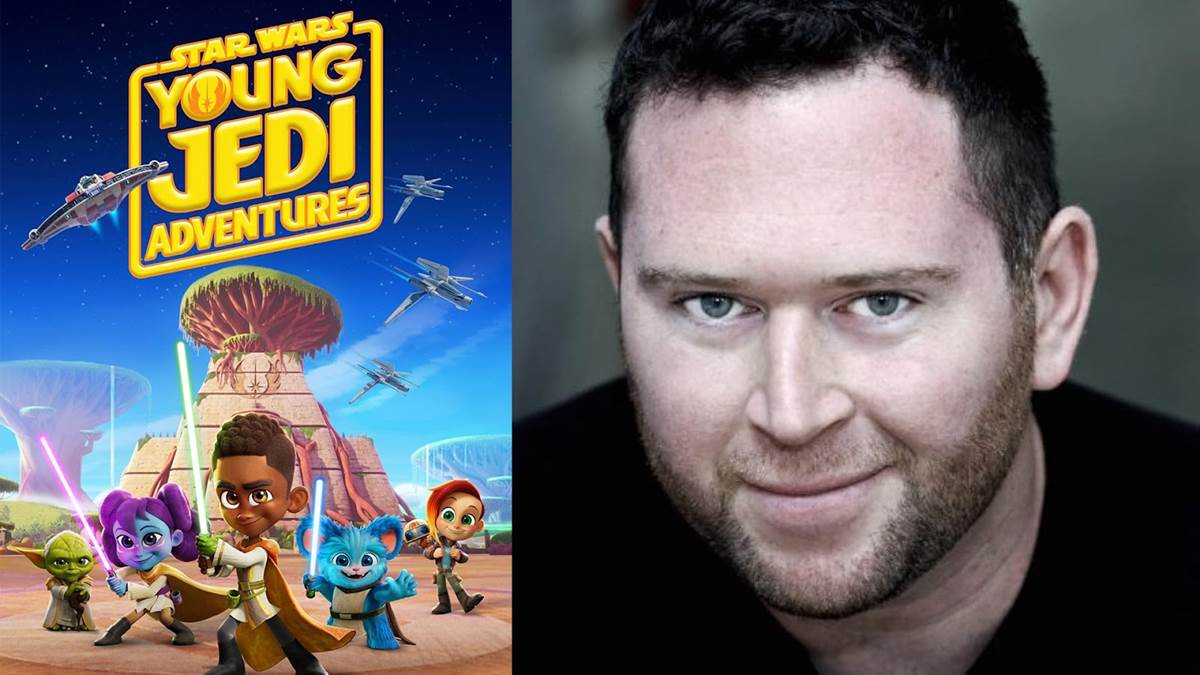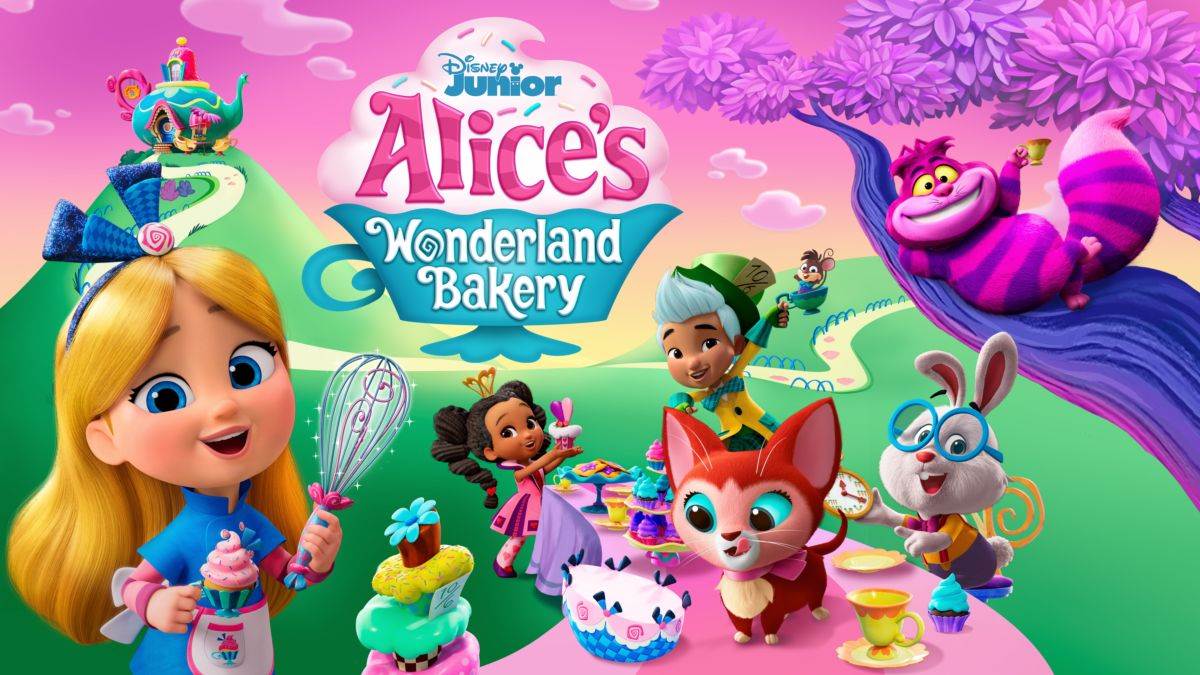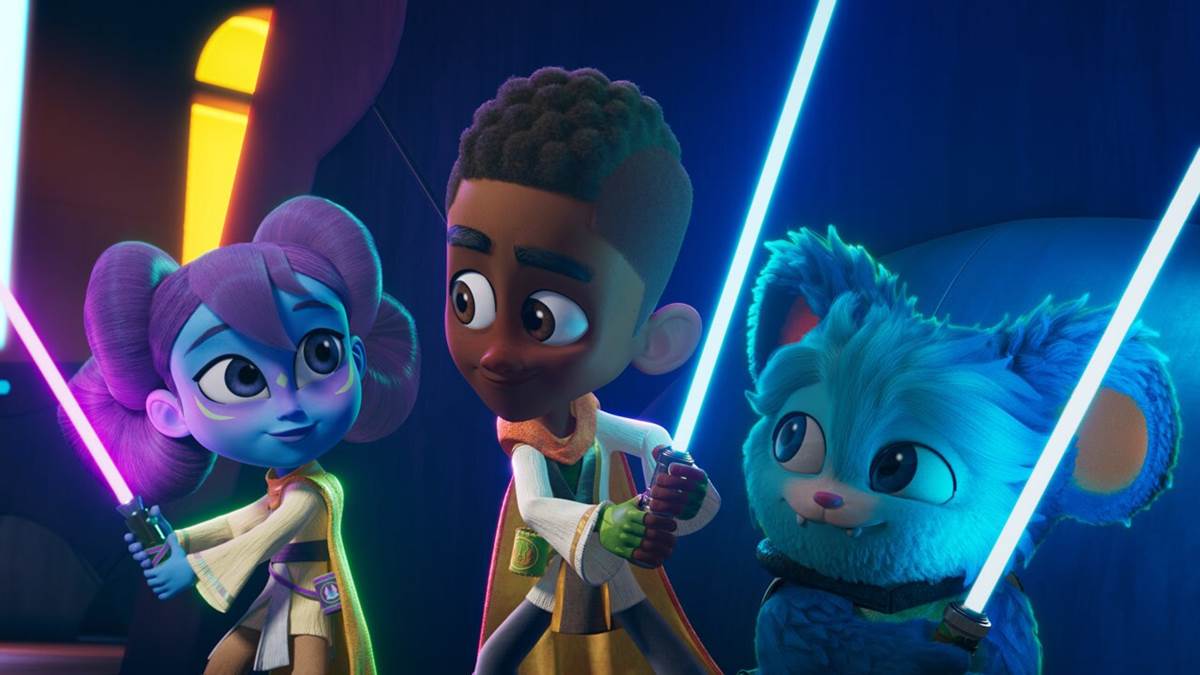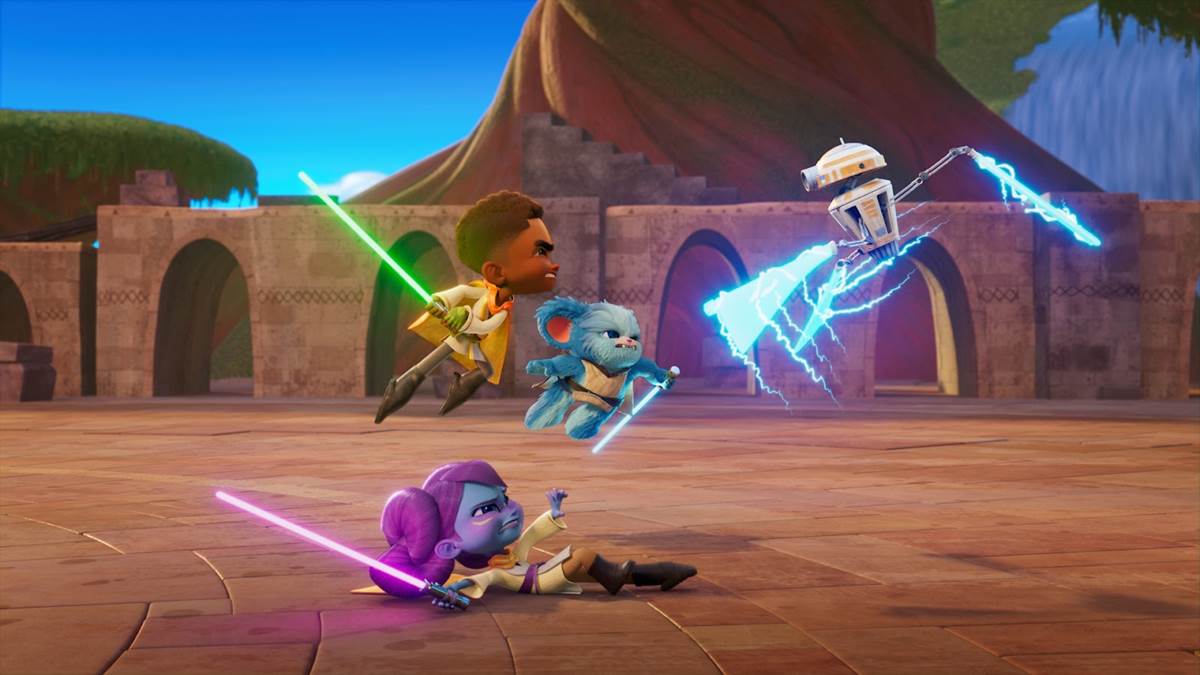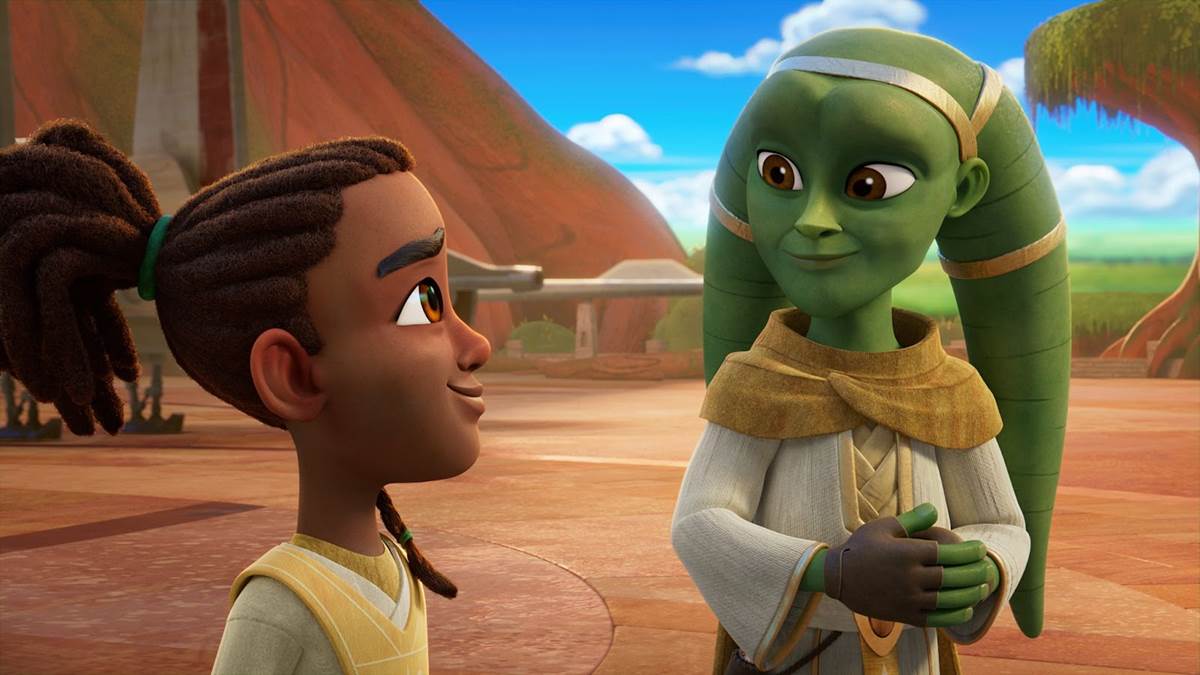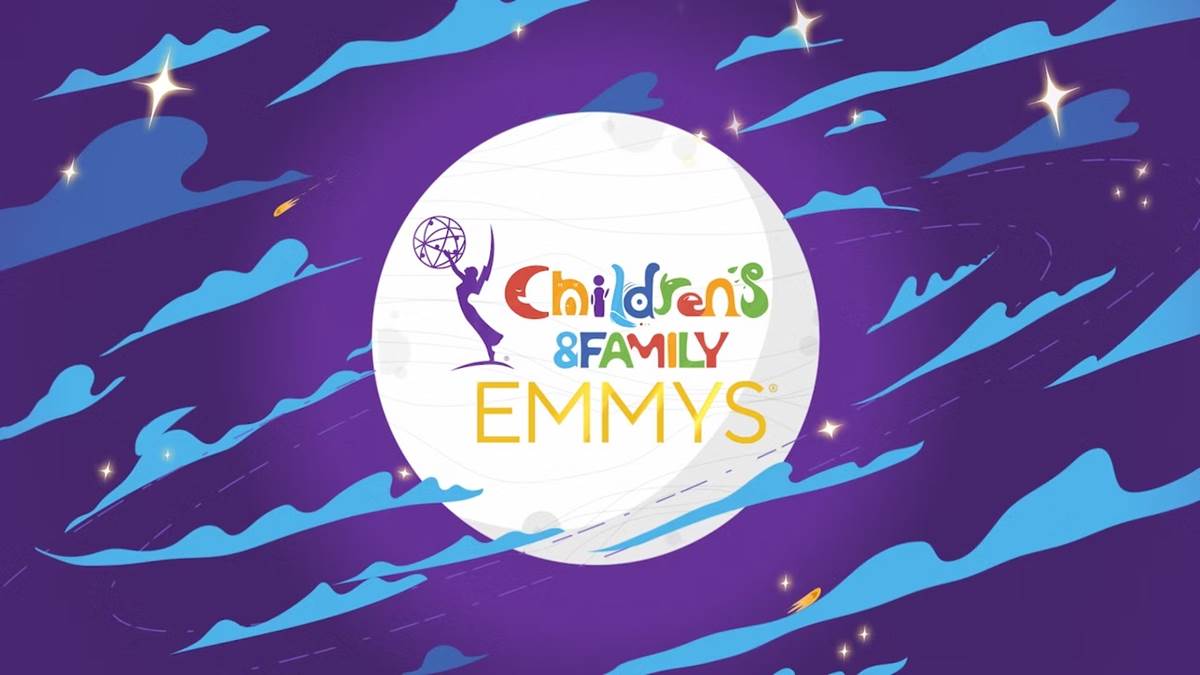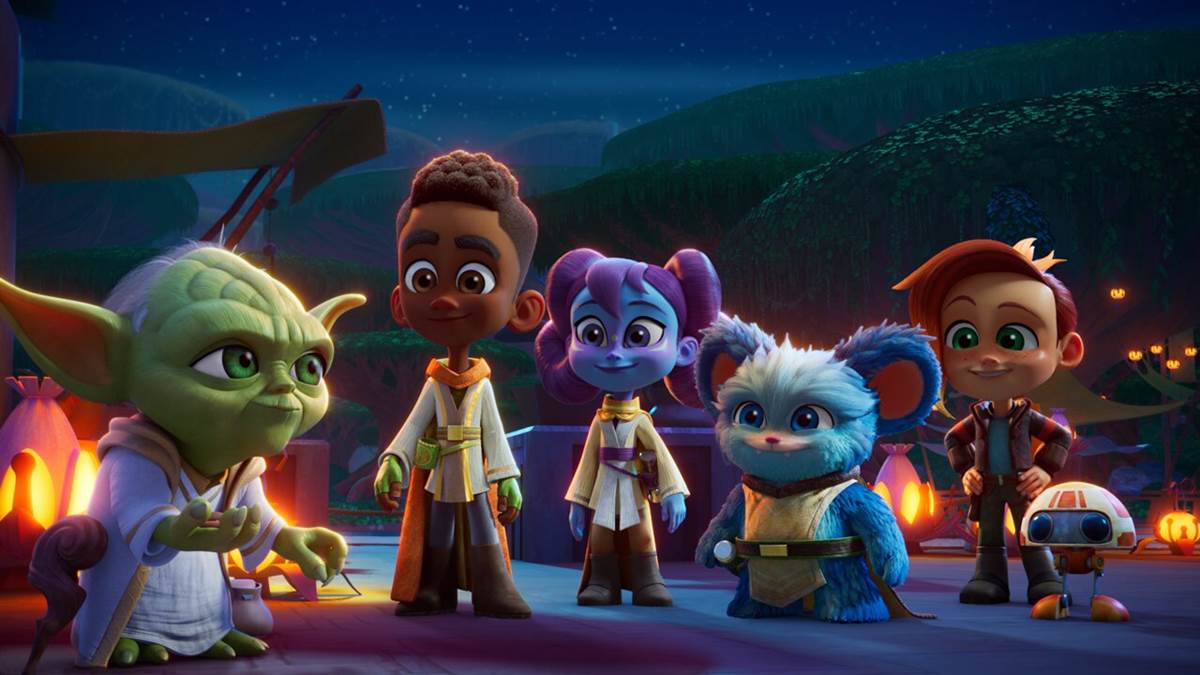Composer Matthew Margeson has been working in the Hollywood music scene for nearly 20 years, contributing scores to projects like the popular Kingsman franchise, the Elton John biopic Rocketman, and the Tim Burton film Miss Peregrine’s Home for Peculiar Children. He has now been nominated in the category of Music Direction And Composition For An Animated Program for this year’s Children’s and Family Emmy Awards for his work on the Disney Junior / Disney+ series Star Wars: Young Jedi Adventures. This week I had the chance to speak with Matthew about his music career, his nomination, and his relationship with the Star Wars franchise.
Mike Celestino, Laughing Place: What was your relationship with Star Wars growing up? Have you been a fan for a long time?
Matthew Margeson: Oh, absolutely. I mean, I was born in 1980, so right in the years of having that stuff come out when I was in my early youth was definitely impressionable. To be honest, one of my earliest memories watching a film and having a potent memory of it was in [Return of the] Jedi when the mask comes off of Darth Vader. I remember watching the other films, and you remember the lightsaber battles and flying around in space and everything, but as far as an actual moment that has stuck with me, I can tell you exactly where I was, what I was feeling, how old I was when Vader takes off his helmet. That’s such a huge moment in the franchise, but in my life as well, as it turns out.
LP: And how much of that for you, at that early age, was the music? How much did the music stick out to you in the Star Wars films at that point?
Margeson: It definitely did. I got involved in playing instruments when I was really young– I started playing piano when I was five. Not only Star Wars, but whatever it is that John Williams does– those devices that he uses in his film music– I think I speak for a whole crowd of people that watch stuff from the 70s through today, that he just brings whatever that is– the combination of him and George Lucas and Steven Spielberg. It makes you fall in love with genres and fall in love with music and fall in love with stories. You can play any one of his themes and most people are gonna be like, ‘Oh, of course– that’s E.T., or that’s Jaws, or that’s Star Wars, or that’s Indiana Jones.’ So yeah, definitely the music in those films played a massive role [in] me falling in love with movies, and with music, and with film music.
LP: How did you get your start as a film and TV composer?
Margeson: When I was in high school, I worked at a video rental store. It wasn’t a Blockbuster– it was a mom-and-pop shop that only the local neighborhood went into– so as an employee there, you just got to sit around and watch movies all day. And already having a love for music– I actually did a lot of musical theater when I was little: I started doing some acting in community shows and local things. And as my piano skills got honed in, I started doing musical directions, so [I had] lots of experience growing up in playing underscore along with theater groups. Then I found out that there was a music school up in Boston, Berklee College of Music, and they had an actual degree in music for film. So that just seemed like a recipe [for] figuring that out while I was developing this love of music for media. That was it, and then after four years in Boston, I drove out to L.A. and just was in the right place at the right time, and met the right people, and navigated politically and musically how to always take the next step, and realizing that you’re a little bit ahead of where you were six months ago. And now I’m sitting here with you [laughs] 20 years later.
LP: How did Star Wars: Young Jedi Adventures come about for you?
Margeson: I had been working on another show for Disney Television Animation called Alice’s Wonderland Bakery, which is just an extension of the Alice In Wonderland IP that we all know from the classic Disney movie. And in the middle of working on that show, the music producers over at Disney were like, ‘Hey, we have this new show that we’re doing as a collaboration with Lucasfilm. It’s gonna be the first Star Wars show where the main [demographic] is three-to-six-year-olds. And they said, ‘We think you’d be a good fit for it. Would you want to write some music and see what they think? They were talking to other people too, and it was like, ‘Let’s give these composers a briefing.’ And you write three to five minutes, and they don’t look at the names and judge things [solely] on what they’re hearing. It’s funny: my first attempt at a demo for the show was using a lot of the tunes, like the main Jedi tune that I have. Because John Williams, [with] a lot of that stuff he has these big, nice, sexily harmonic brass chords, and these big fanfares.
And so I said, ‘Well, since it’s for kids, let’s try to do a spin on it,’ so I faked my best John Williams, but instead of those big brass tunes and fanfares, I used kazoos. [laughs] And it was like, ‘They may absolutely hate this, but at least it’s bold. At least it’s something they’ll remember, so let’s submit this.’ So I submitted this demo, and I got the call a couple weeks later saying, ‘We want to offer you the position as composer on the show. We absolutely love themes. We want you to expand on them. We hate the kazoos. We never want to hear the kazoos again.’ [laughs] But it’s one of those things that, if I had maybe done those tunes in that demo on more traditional western orchestral brass, maybe the tunes would have been fine but maybe they wouldn’t have remembered as well. Who knows what it was, but the combination of them absolutely hating the kazoos and saying, ‘We never want to hear them again, but we love the tunes. We love energy, we love the world you created, so let’s build on that, but leave the kazoos at the door.’
LP: How was your approach to the Young Jedi Adventures score different from your work on other projects, which have spanned many different genres?
Margeson: All the projects that I’ve been a part of, I’m able to pull pieces of music and scenes that I’m really proud of. I know it sounds cliche, but they are all your little babies. They are all your little children that at one time or another you were pouring your heart into, but with film music these days– and this is not a statement that covers all film music– but things have to be accessible for the brain to process. [With] a lot of the action films these days, a lot of it is essentially rock n’ roll for orchestra– it’s a couple chords, it’s a couple devices that you use to make things feel intense. The thing that stands out for Star Wars with me is that the scores of the original films are always our North Pole as far as what we’re allowed to do harmonically. We’re allowed to have a little bit more crunch and a little bit more theme and be brave as far as the orchestration [in a way] that I might not have gotten away with in say, a Kingsman or Rocketman, because those are a bit more centered in, ‘We’re gonna stick with the four chords that we love and that sound like Kingsman.’ Whereas [with] Star Wars, we can have things that might not relate to each other or borrowed harmonic devices from other chords or scales that really– my hope is– evoke what John has created for this world.
LP: What about the actual recording process for this score? Is it a full orchestra or mostly synthesizers?
Margeson: Most of the music that’s in the show is done without live musicians, just because we don’t necessarily have the time or money to record everything. We did record the main title, and we did record the end credits [with an orchestra] before we even started working to actual picture. And there are instances throughout I’d say every episode where there might be some very important instrument, or some very important theme, that I’ll go out and get a small group of players or a soloist to come in and do the ethnic flute that might be there, or some sort of solo cello that might be there that we really want to bring the extra ‘je ne sais quoi’ to the music, to really evoke whatever emotion you’re trying to do for those bits and pieces– those little moments. Those little nuggets that need to stand out, we’ll spend a little time recording some extra musicians on. But to answer your question, most of it is just using the samples that are accessible to anyone, and software to generate all the music.
LP: Can you tell me about your working relationship with your collaborators at Lucasfilm, and the creative talent behind the series?
Margeson: Every two weeks, we all get together on Zoom. There’s a group of maybe six to ten people that are on the Zoom, and [co-creators] Michael Olson and Elliot Bour, who are our two Grand Poobahs, they’re the ringleaders. You have the creative producer, the creative director, and so most of the conversations that I have regarding whatever episode I’m gonna embark on are with those two. We go through each episode and we talk about the macro, and what each scene needs, and pace-wise, and how exciting [it should be]. And the thing we have to keep in mind is that it is a show where, like I said, the main demo is three-to-six-year-olds. So there’s always a balance of, ‘How dark do we want to go? How much do we want to scare the kids? Where is that threshold?’ And each episode you find it, and then of course, like all projects, in the micro of each scene, there are little moments of dialogue that they’ll tell me, ‘Oh, that’s important,’ or ‘This character’s gonna come back in three episodes, so we do want to have a theme for them that we can bring back and tie it all together.’
So those conversations are really valuable for me, because they have much more of a bird’s-eye [view] of a whole season of the show, and what’s coming in five episodes, and what’s coming in ten episodes. And then there are other people that are involved in those Zooms. I’d say most of the main dialogue is [between] me, Michael, and Elliot, [but] there’s also sidebars with me and the sound guys and me and the dialogue guys. A lot of these conversations are like, ‘Is this a sound effects moment or is this a music moment?’ We don’t want to be clashing [with] each other, so those conversations are also good to have in parallel, so that we can figure out who’s the ‘lead singer’ at all times, if that makes sense.
LP: Are there any particular character themes that you’ve come up with for this show that you’d like to highlight?
Margeson: Let’s see… there’s a character who’s one of the Legacy characters [from Star Wars: The High Republic]– and I’ll preface this by saying I love the nine Star Wars films and the other main offshoots, and I’ve watched some of the TV shows. I’m completely aware that the world’s so expansive, and as much as I love it being a child of the 80s, I have to admit that I haven’t gone and watched every single series. So when there’s a new character, for instance, in Young Jedi Adventures, I’m always like, ‘Is this a character just for our show or is there much more of a history that I may not know about?’ There’s one character, his name is Bell Zettifar, and he’s been in a couple episodes. His tune is one that when I first wrote the theme for him, in the first episode that he’s in, I was like, ‘Ooh, I think I’m onto something really nice here,’ because it’s done in a very introductory sort of a way, where you just have a statement of the tune: ‘Here’s our new character.’ And he has a dog Ember– their tunes are co-symbiotic with each other. I [like] to deconstruct these things– let me challenge myself. That tune was written in a really romantic sense, but [then] we get to do it where he’s fighting off the baddies, so how can we deconstruct it and do it in more of an action sense? That’s always fun for me.
LP: It must be neat to be able to create themes for these pre-existing characters who haven’t necessarily appeared in a visual medium before.
Margeson: Yeah, the same thing has happened with a couple of the ships [that] have their own theme, and a couple of the planets and the spaces and the pirate world we’ve created that I know have some sort of history, but like you said, might not have actually been presented in a visual medium yet, so it’s exciting to be able to contribute to this massive world that’s very precious.
LP: Congratulations on your Children’s and Family Emmy Award nomination. What was your reaction when you first heard about being nominated?
Margeson: Well, I’m first of all glad that NATAS and the whole Emmy association has been aware enough to [create this subcategory], because before last year, the ‘Children’s and Family’ genre of films and television shows were all part of the Daytime Emmys. So things like Sesame Street and Days of Our Lives and General Hospital and Young Jedi [Adventures] would be all competing for the same recognition. I think it’s really beautiful that they’ve actually [created this]. There’s so much content now, especially when you open up the world to the streaming services, that it’s nice that they now have the Sports Emmys and the Documentary Emmys and the Daytime and the Primetime. It’s nice to give each genre of medium their own little space.
And to be honest with you, when I got the nomination, I was deep in the throes of COVID. [laughs] It was actually good timing, because we were trying to look at the glass half full. Me and my whole family went down with it, and it was like, ‘Well, at least now we’re good for the winter season, hopefully, for a couple months.’ But I wanted to be able to go out and celebrate, and it was like, ‘No, you have to stay in this bedroom by yourself for the next two weeks.’ [laughs] But you never start one of these shows even thinking about something like [getting nominated]– that’s never the goal. It’s always like, ‘Maybe we’ll submit this for an Emmy, because the show’s really good.’ I’m really really happy with what I landed on for the music, so you never know. As much of a surprise [as it was], it’s nice to be recognized for these things.
LP: Were you familiar with any of your fellow nominees in this category: Animaniacs, Kung Fu Panda: The Dragon Knight, Looney Tunes Cartoons, or Tom and Jerry: Cowboy Up?
Margeson: You know, I’m embarrassed to say that I’m not too familiar with [them]. While I was in bed with COVID, I did have a thought to, ‘Let me go do some recon on these shows and see how the competition is,’ except I said, ‘All that’s gonna do is produce some anxiety for me.’ The one person I do know on the Kung Fu Panda special is [the] music supervisor, [and] an old friend of mine who I worked with many years ago, Vivien [Aguiar-Buff]. So I’m really glad that at least I’ll be able to see her and say hi at the ceremony, and have a cheers for whatever happens.
LP: What else is coming up for you as a composer?
Margeson: Good question. Well, as you know, we’re coming off the tail of this multi-month-long strike for both the writers and the actors, so to be perfectly honest with you, there’s a couple things that are in the air right now– nothing that I can specifically chat about. Alice’s Wonderland Bakery has not been renewed for a third season, so it’s bittersweet but I’m just starting my last episode of that, which will be finished by the end of the year. I’ll be working on a couple other things: a video game that’s in the works, and maybe a movie or two. I’ve been working on Alice and Jedi almost exclusively for the past year and a half, but [the Pete Davidson Peacock series] Bupkis slid in there for a couple months. I am really looking forward to getting back into the film medium. I do miss it.
The first 19 episodes of Star Wars: Young Jedi Adventures are available to stream right now via Disney+, with another batch on the way early next year. The series also airs on Disney Junior. The 2023 Children’s and Family Emmy Awards ceremony will be held on Saturday, December 16th.

